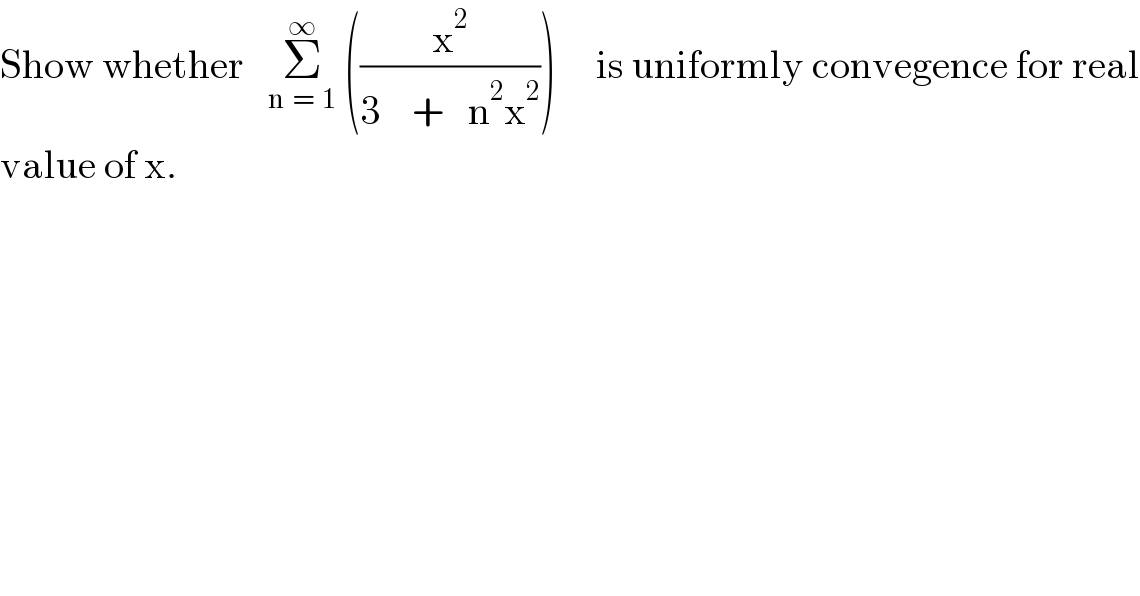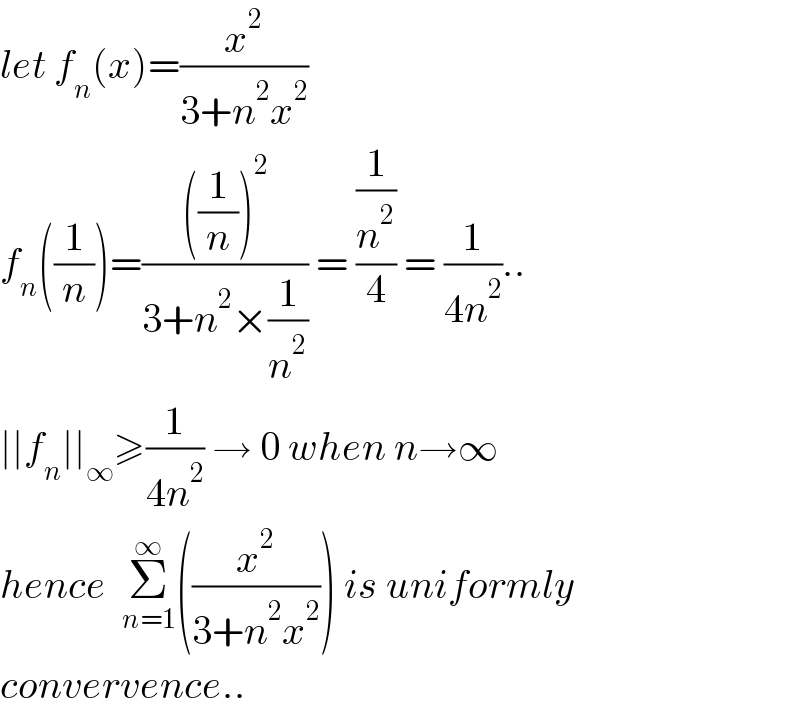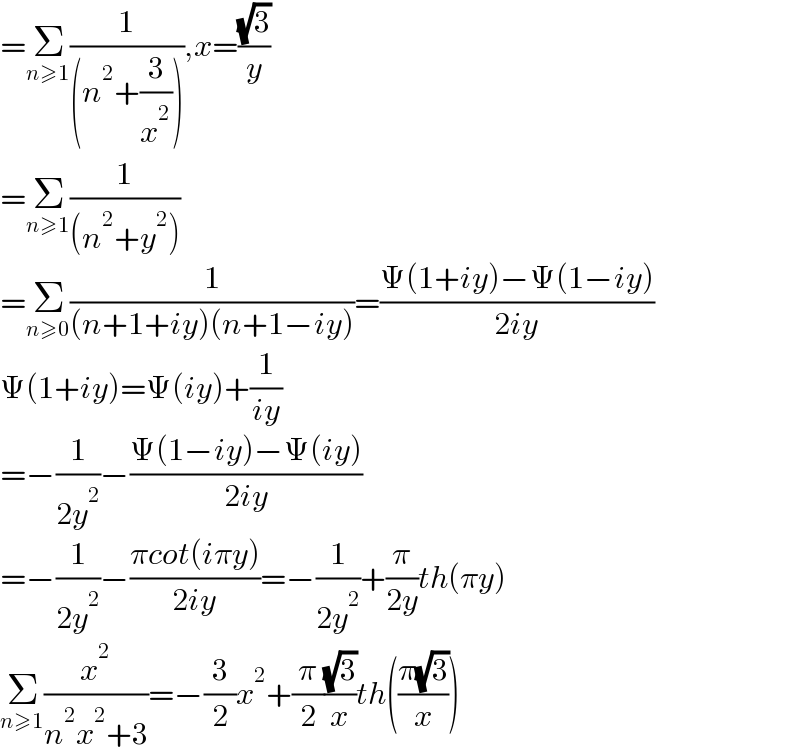
Question Number 153518 by Tawa11 last updated on 08/Sep/21

$$\mathrm{Show}\:\mathrm{whether}\:\:\:\underset{\mathrm{n}\:\:=\:\:\mathrm{1}} {\overset{\infty} {\sum}}\:\left(\frac{\mathrm{x}^{\mathrm{2}} }{\mathrm{3}\:\:\:\:+\:\:\:\mathrm{n}^{\mathrm{2}} \mathrm{x}^{\mathrm{2}} }\right)\:\:\:\:\:\mathrm{is}\:\mathrm{uniformly}\:\mathrm{convegence}\:\mathrm{for}\:\mathrm{real} \\ $$$$\mathrm{value}\:\mathrm{of}\:\mathrm{x}. \\ $$
Answered by puissant last updated on 08/Sep/21

$${let}\:{f}_{{n}} \left({x}\right)=\frac{{x}^{\mathrm{2}} }{\mathrm{3}+{n}^{\mathrm{2}} {x}^{\mathrm{2}} } \\ $$$${f}_{{n}} \left(\frac{\mathrm{1}}{{n}}\right)=\frac{\left(\frac{\mathrm{1}}{{n}}\right)^{\mathrm{2}} }{\mathrm{3}+{n}^{\mathrm{2}} ×\frac{\mathrm{1}}{{n}^{\mathrm{2}} }}\:=\:\frac{\frac{\mathrm{1}}{{n}^{\mathrm{2}} }}{\mathrm{4}}\:=\:\frac{\mathrm{1}}{\mathrm{4}{n}^{\mathrm{2}} }.. \\ $$$$\mid\mid{f}_{{n}} \mid\mid_{\infty} \geqslant\frac{\mathrm{1}}{\mathrm{4}{n}^{\mathrm{2}} }\:\rightarrow\:\mathrm{0}\:{when}\:{n}\rightarrow\infty \\ $$$${hence}\:\:\underset{{n}=\mathrm{1}} {\overset{\infty} {\sum}}\left(\frac{{x}^{\mathrm{2}} }{\mathrm{3}+{n}^{\mathrm{2}} {x}^{\mathrm{2}} }\right)\:{is}\:{uniformly}\: \\ $$$${convervence}.. \\ $$
Commented by Tawa11 last updated on 08/Sep/21

$$\mathrm{God}\:\mathrm{bless}\:\mathrm{you}\:\mathrm{sir}.\:\mathrm{I}\:\mathrm{appreciate}. \\ $$
Answered by mindispower last updated on 08/Sep/21

$$=\underset{{n}\geqslant\mathrm{1}} {\sum}\frac{\mathrm{1}}{\left({n}^{\mathrm{2}} +\frac{\mathrm{3}}{{x}^{\mathrm{2}} }\right)},{x}=\frac{\sqrt{\mathrm{3}}}{{y}} \\ $$$$=\underset{{n}\geqslant\mathrm{1}} {\sum}\frac{\mathrm{1}}{\left({n}^{\mathrm{2}} +{y}^{\mathrm{2}} \right)} \\ $$$$=\underset{{n}\geqslant\mathrm{0}} {\sum}\frac{\mathrm{1}}{\left({n}+\mathrm{1}+{iy}\right)\left({n}+\mathrm{1}−{iy}\right)}=\frac{\Psi\left(\mathrm{1}+{iy}\right)−\Psi\left(\mathrm{1}−{iy}\right)}{\mathrm{2}{iy}} \\ $$$$\Psi\left(\mathrm{1}+{iy}\right)=\Psi\left({iy}\right)+\frac{\mathrm{1}}{{iy}} \\ $$$$=−\frac{\mathrm{1}}{\mathrm{2}{y}^{\mathrm{2}} }−\frac{\Psi\left(\mathrm{1}−{iy}\right)−\Psi\left({iy}\right)}{\mathrm{2}{iy}} \\ $$$$=−\frac{\mathrm{1}}{\mathrm{2}{y}^{\mathrm{2}} }−\frac{\pi{cot}\left({i}\pi{y}\right)}{\mathrm{2}{iy}}=−\frac{\mathrm{1}}{\mathrm{2}{y}^{\mathrm{2}} }+\frac{\pi}{\mathrm{2}{y}}{th}\left(\pi{y}\right) \\ $$$$\underset{{n}\geqslant\mathrm{1}} {\sum}\frac{{x}^{\mathrm{2}} }{{n}^{\mathrm{2}} {x}^{\mathrm{2}} +\mathrm{3}}=−\frac{\mathrm{3}}{\mathrm{2}}{x}^{\mathrm{2}} +\frac{\pi}{\mathrm{2}}\frac{\sqrt{\mathrm{3}}}{{x}}{th}\left(\frac{\pi\sqrt{\mathrm{3}}}{{x}}\right) \\ $$
Commented by Tawa11 last updated on 08/Sep/21

$$\mathrm{God}\:\mathrm{bless}\:\mathrm{you}\:\mathrm{sir}.\:\:\mathrm{I}\:\mathrm{appreciate}. \\ $$
Commented by Tawa11 last updated on 08/Sep/21

$$\mathrm{What}\:\mathrm{is}\:\:\mathrm{th}\:\:\mathrm{sir}. \\ $$
Commented by mindispower last updated on 08/Sep/21

$${th}\left({x}\right)=\frac{{sh}\left({x}\right)}{{ch}\left({x}\right)}=\frac{{e}^{{x}} −{e}^{−{x}} }{{e}^{{x}} +{e}^{−{x}} } \\ $$
Commented by Tawa11 last updated on 08/Sep/21

$$\mathrm{Ohh}.\:\mathrm{Thanks}\:\mathrm{sir} \\ $$
